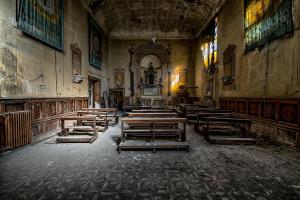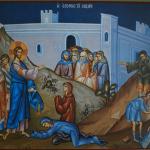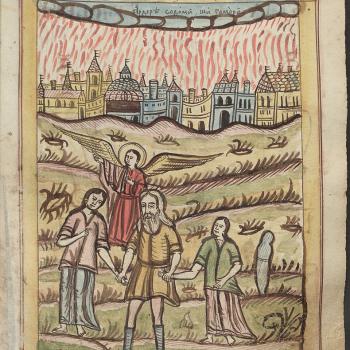
With COVID-19 exponentially spreading across the world, quarantines have been put in place, restricting where people can go, and how many people can congregate together. This is necessary in order to save lives. As a result, most places of worship have temporally found themselves closed to the general public. This is not because the state is fighting against religion, nor indeed, discriminating against religion, but because the state is equally applying social distancing to all.[1] It is the furthest thing from religious discrimination, because religion is not being singled out. This is why it is ludicrous for various churches, or other places of worship, to try to defy the state and continue as normal, and argue they can do so on the basis of religious liberty.
Religious liberty is fundamental. “The Church reproves, as foreign to the mind of Christ, any discrimination against men or harassment of them because of their race, color, condition of life, or religion.”[2] Thus, Dignitatis humane proclaims:
This Vatican Council declares that the human person has a right to religious freedom. This freedom means that all men are to be immune from coercion on the part of individuals or of social groups and of any human power, in such wise that no one is to be forced to act in a manner contrary to his own beliefs, whether privately or publicly, whether alone or in association with others, within due limits.[3]
What those who try to suggest that they can ignore the state because of religious liberty ignore is that religious liberty is not unconditional, that is, it is not unlimited. People cannot use religious liberty to justify the rejection of the common good. If someone said it was their religious belief that they should murder someone else, or steal from the poor, or torture their neighbor, they can be stopped by the state and religious liberty is not going to be violated. Religious liberty comes from and flows from the common good and the rights and responsibilities which are expected for the common good to be promoted. Moral principles cannot be subverted under the guise of religious liberty:
The right to religious freedom is exercised in human society: hence its exercise is subject to certain regulatory norms. In the use of all freedoms the moral principle of personal and social responsibility is to be observed. In the exercise of their rights, individual men and social groups are bound by the moral law to have respect both for the rights of others and for their own duties toward others and for the common welfare of all. Men are to deal with their fellows in justice and civility. [4]
Religious liberty requires we accept and promote the common good, and therefore, the welfare of our neighbor. James, understanding this, writes: “Religion that is pure and undefiled before God and the Father is this: to visit orphans and widows in their affliction, and to keep oneself unstained from the world” (Jas. 1:27 RSV). James demonstrates the charity which must be found in authentic religious practice. When it is ignored, religion itself becomes defiled. When we ignore our responsibility towards our neighbor, we have subverted authentic religious values. This is why the state has the authority to place demands upon us and expect us to follow those demands, even when it affects us in the exercise of our religion. This is how society defends itself from those who would abuse religion and use it as an excuse to ignore responsibility for the common good:
Furthermore, society has the right to defend itself against possible abuses committed on the pretext of freedom of religion. It is the special duty of government to provide this protection. However, government is not to act in an arbitrary fashion or in an unfair spirit of partisanship. Its action is to be controlled by juridical norms which are in conformity with the objective moral order. These norms arise out of the need for the effective safeguard of the rights of all citizens and for the peaceful settlement of conflicts of rights, also out of the need for an adequate care of genuine public peace, which comes about when men live together in good order and in true justice, and finally out of the need for a proper guardianship of public morality. [5]
The fact that shelter-in-place and stay-at-home orders are established universally, and are not being used to discriminate against religion, but rather, to encourage religious people to follow the charity that authentic religion promotes, there is no basis to suggest religious liberty is being violated. As we continue to deal with the coronavirus, those churches, those pastors, those so-called faithful who attack such orders, suggesting that their faith is being attacked because of temporary closures of houses of worship for the sake of an emergency, are the ones who are attacking religion by ignoring the duty of the faithful to promote the common good. They would not approve of religious liberty being used to justify someone killing them; similarly, we cannot approve of the use of religious liberty to promote mass deaths.
Those who say the faithful should ignore the state, and put themselves and others into jeopardy, show how far they are from understanding who God is. They are turning religion into a letter that kills instead of the means of following the Spirit towards life. Religion should not be turned into a death cult, where adherents feel they must unnecessarily risk their lives – and the lives of their neighbors. Christians who want to worship God can do so at home when they cannot get to church. Jesus himself suggested as much:
Jesus said to her, “Woman, believe me, the hour is coming when neither on this mountain nor in Jerusalem will you worship the Father. You worship what you do not know; we worship what we know, for salvation is from the Jews. But the hour is coming, and now is, when the true worshipers will worship the Father in spirit and truth, for such the Father seeks to worship him. God is spirit, and those who worship him must worship in spirit and truth” (Jn. 4:21-24 RSV).
Thus, we can go into our own inner room, our own heart (cf. Matt 6:6) to pray. God will still meet with us and show us his love. We can worship him, and in our desire, receive his grace. We must put our trust in him and his love. Those who think he is limited to how he can be worshiped or where he can be worshiped should reconsider. God is omnipresent. God is not bound. Perhaps they should see this as a test, to see if they truly put their trust in God and his universal love. This is not to say, when things go back to normal, we should abandon normative forms of worship for God; what we should abandon is any understanding that absolutizes those forms of worship as being binding to God. They are normative for us, but being normative instead of absolute, that means there are other forms of worship and grace possible.
With the spread of the coronavirus continuing to grow exponentially, now is not the time to think we can go back to normal. If we truly love God, we will love our neighbor as ourselves, and we will work for their own welfare. We will not fight against necessary social restrictions which will help our neighbor. Rather, we will see it as a part of our duty, not only to the state, but to God himself, to do what we can to halt the pandemic. Any other response shows how far we are from understanding the ways of undefiled religion.
[1] Essential workers and services are the exception, because they are necessary for the continuation of life. Churches, mosques, temples, and the like, are not necessary, because the faithful in times of quarantine can still worship God in the privacy of their home.
[2] Nostra Aetate. Vatican translation. ¶5.
[3] Dignitatis humanae. Vatican translation. ¶2.
[4] Dignitatis humanae, ¶7.
[5] Dignitatis humanae, ¶7.
Stay in touch! Like A Little Bit of Nothing on Facebook.
If you liked what you read, please consider sharing it with your friends and family!













